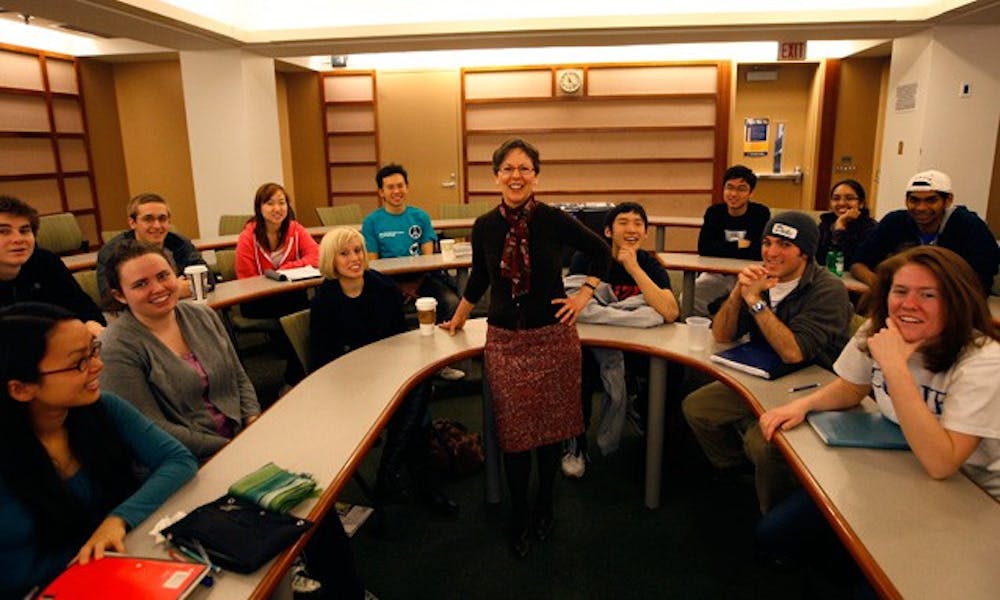Alma Blount is someone who could tell you the sky was falling with a smile on her face.
While I sat in Blount’s office one day in early March, she practically did, recounting grief she endured on her path to Duke. But she narrates even her hardest stories with optimism and warmth. I had visited her office—a place where overflowing bookshelves and vibrant paintings from Latin America coexist within a meticulously organized work space—previously as a student in her Adaptive Leadership course. But this time I was there to hear her story, one that had only come out in bits and pieces in my one semester with her.
After falling in love with Latin America during a trip to Mexico and graduating from The University of North Carolina at Chapel Hill with a B.A. in journalism, Blount worked for several human rights organizations tied to the Catholic Church in Nicaragua and El Salvador during the internal guerilla conflicts that plagued Latin America during the 1980s. She had heard stories of disappearances and murders; she had even known people who were direct victims of violence but continued with her work. In the fall of 1989, however, six prominent Jesuit priests and their two housekeepers—all of which Blount knew—were murdered by members of the right wing El Salvadorian government’s army. “I knew people who had lost their lives… but that [the murder of the priests and housekeepers] was a really big blow for me,” she told me. “I remember turning to my husband and saying, ‘OK, I’m going to take a break and go to divinity school.’”
While still working in El Salvador, Blount received a full scholarship to Harvard Divinity School, where she studied religion in public life. There, Blount met her mentor, Ronald Heifetz, a co-founder of the Center for Public Leadership at the John F. Kennedy School of Government. Heifetz introduced Blount to a new approach of tackling the complex and draining humanitarian issues she had faced in her human rights work in Latin America.
“The art of leadership intrigued me,” she said. “I felt the work I was doing was very much about leadership. It was about getting people to pay attention to these human rights violations and act on them and change policies. But to examine how it actually happens within cultures, organizations, systems and groups was completely fascinating to me.”
She spent her childhood living in the mountains of North Carolina, and Blount credits her family—which has lived in North Carolina since the mid-17th century—with inspiring her to pursue a career that incorporated a love for politics, place and religion. “Feeling deeply rooted to a place is very important in my family,” she said. “Over the years people in my family have always been very involved with the land, very involved with law and very involved with politics. That’s my tradition so ever since I was a little girl I have felt conscious of that tradition, and I’ve had a sense that I could do what I wanted from my life.”
University initiatives like DukeEngage, the Duke Global Health Institute and Kenan Institute for Ethics have only recently become fixtures for many Duke undergraduates seeking meaningful community-based service learning experiences. But there has been institutional support for its precursors since 1987: The Hart Leadership program, which includes programs like Service Opportunities in Leadership and the Hart Fellows Program, was endowed that year by Miledge A. Hart.
In 2001, Blount became the director of the Hart Leadership Program emphasizing integrating experiential learning in the field through by steeping it in academic study.
“This tradition is what I call integrative learning,” she said. “You know you have these experiences that are challenging, that open new horizons for you and then you have a context in a group with your peers and teacher and bring you understanding to a much deeper level because you’re studying it intellectually.”
Blount—and the Hart Leadership program—also prizes the power of storytelling. After graduating from UNC-Chapel Hill, Blount was a founding staff member of The Independent. She spent three years covering stories around the state as its chief photographer.
“Part of me has always been very much interested in doing and part of me is also interested in telling the story and making meaning and understanding the critical reflection aspect of what I’m doing,” she told me. “When you take my classes that’s what’s called the reflective stance. My great love of telling stories… is a beautiful complement to the part of me who is really interested in actions, goals, accomplishments.”
Since the University’s expansion and coordination of its civic engagement programs, it’s become increasingly competitive to apply to Hart, and the demand has exceeded current capacity. But Blount, true to form, sees the good in this. “More and more students are not shying away from the intensity or demands of our courses, they’re embracing it,” she said. “They want to be challenged intellectually, and in terms of the difficulty of the field unique.”
Get The Chronicle straight to your inbox
Signup for our weekly newsletter. Cancel at any time.

